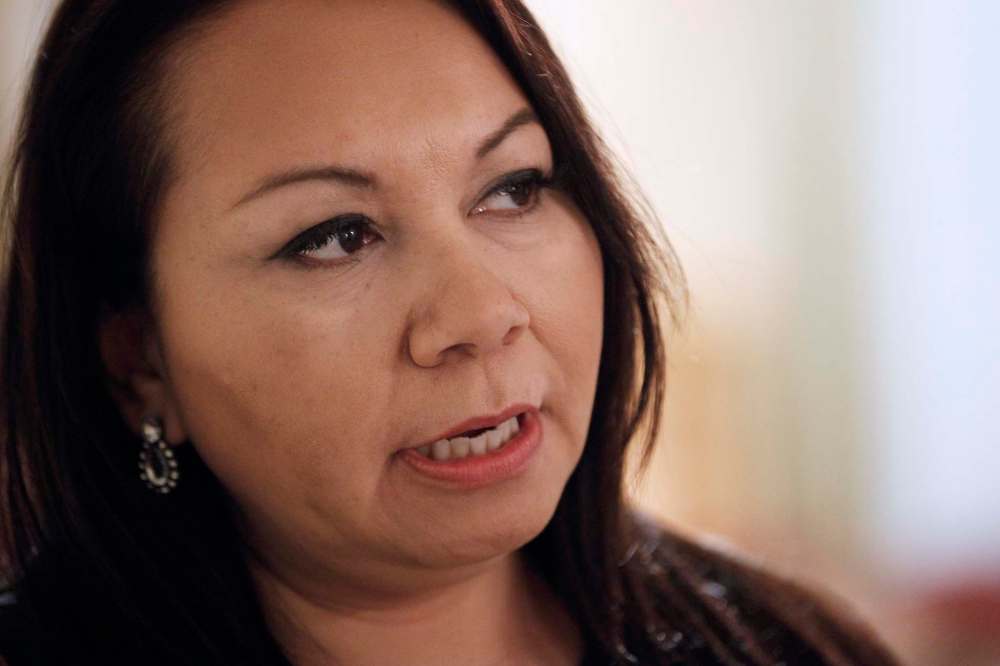Suicide-crisis teams in northern Manitoba at their limit
Counsellors have been busy since program's launch, chief says
Advertisement
Read this article for free:
or
Already have an account? Log in here »
To continue reading, please subscribe:
Monthly Digital Subscription
$0 for the first 4 weeks*
- Enjoy unlimited reading on winnipegfreepress.com
- Read the E-Edition, our digital replica newspaper
- Access News Break, our award-winning app
- Play interactive puzzles
*No charge for 4 weeks then price increases to the regular rate of $19.00 plus GST every four weeks. Offer available to new and qualified returning subscribers only. Cancel any time.
Monthly Digital Subscription
$4.75/week*
- Enjoy unlimited reading on winnipegfreepress.com
- Read the E-Edition, our digital replica newspaper
- Access News Break, our award-winning app
- Play interactive puzzles
*Billed as $19 plus GST every four weeks. Cancel any time.
To continue reading, please subscribe:
Add Free Press access to your Brandon Sun subscription for only an additional
$1 for the first 4 weeks*
*Your next subscription payment will increase by $1.00 and you will be charged $16.99 plus GST for four weeks. After four weeks, your payment will increase to $23.99 plus GST every four weeks.
Read unlimited articles for free today:
or
Already have an account? Log in here »
Hey there, time traveller!
This article was published 25/07/2017 (3044 days ago), so information in it may no longer be current.
OTTAWA — Northern Manitoba suicide-crisis teams are overloaded, according to the region’s First Nations chief, who claims the premier’s stand-off on health funding is delaying federal dollars for Indigenous mental health.
“We’re actually finding that we’re stretched to the limit,” said Sheila North Wilson, chief of the Manitoba Keewatinowi Okimakanak, which represents 30 First Nations in the province’s north.
In Ottawa on Monday, an Ontario group similar to the MKO, the Nishnawbe Aski Nation, signed an agreement with Federal Health Minister Jane Philpott and the Ontario government.

The three pledged to examine funding shortfalls and bureaucratic hurdles to deal with a suicide crisis in fly-in communities like Pikangikum, where 400 of the town’s 2,800 residents are seeking counselling.
It’s the first major agreement after months of advocacy by MKO, NAN and northern Saskatchewan’s Federation of Sovereign Indigenous Nations for what they call “health transformation.”
All three are dealing with regular outbreaks of suicide, where numerous people threaten to end their lives, most often youth in communities with limited access to counselling.
Last June, Ottawa put up $69 million in funding for mental health projects, $10 million of which the MKO has used to employ seven people as crisis-intervention workers, as well as a co-coordinator. A wellness team for post-crisis help is in the works.
“We launched the teams on May 1 and we’ve been busy ever since. It’s never enough,” North Wilson said. The groups focus on suicide crises, but have also responded to trauma from drownings and child deaths, and even Ontario crises. “We’re going to eventually need more teams to do the support work.”
Manitoba is the only province to not sign Ottawa’s health accord, which decides how to allocate $11 billion in funding for mental health and home care over the next 10 years. (Manitoba will still receive its federal transfer payment for hospitals and doctors.)
Earlier this spring, Premier Brian Pallister said he was prepared to sign on to the accord if Ottawa pledged extra cash for Indigenous health care and committed to its proposed “factory of the future” research facility in Winnipeg.
Last week, Pallister called the accords “dangerous for health care, dangerous for Manitobans.” Meanwhile, North Wilson met with Philpott in Winnipeg, and said the two are on the same page about giving First Nations more resources and control over mental health outreach.
But the MKO chief claims that because Pallister’s holdout includes mental-health funding, it’s keeping Manitoba from landing a similar agreement to Monday’s charter with Ontario.
Philpott’s office wouldn’t confirm or deny that claim Monday.
“We’ll continue to work with Indigenous groups across the country,” said Philpott’s spokesman, Andrew MacKendrick.
The Manitoba government said Monday that it’s holding out for an increase to the general health transfer, not the mental-health or home-care funding, which hasn’t yet been allocated to any province.
“Where we disagree with the federal government is reducing the increase on the Canada Health Transfer to three per cent from six per cent. We will continue to oppose that, but it has nothing to do with mental health funding,” wrote cabinet spokeswoman Amy McGuiness.
North Wilson said she’s hoping to work with the provincial government, but might soon ask to go over Pallister’s head and deal with the feds directly. “Ontario has more of a luxury of having a willing provincial government that’s working with them on it,” she said.
Regardless of what’s done to stem the ongoing crisis, North Wilson said governments have to tackle longer-term issues, like health, education and food security.
She said last year’s $40 million in federal funds for a hospital in Pimicikamak, at Cross Lake First Nation, was a good step.
“The legacy of colonialism is that we’ve ended up with extreme poverty and hardship in our communities, and it’s the young people that are feeling it the most.”
dylan.robertson@freepress.mb.ca

